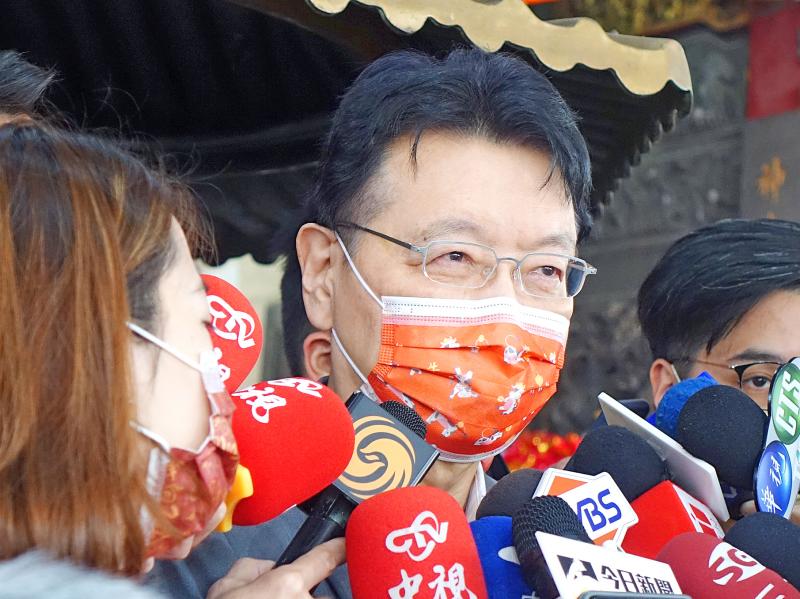The Chinese Nationalist Party (KMT) yesterday announced plans to appoint six new members, including Broadcasting Corp of China (BCC) chairman Jaw Shaw-kong (趙少康), to its Central Advisory Committee.
The other five are former Straits Exchange Foundation vice chairman Kao Koong-lian (高孔廉); Tien Tsai-mai (田在勱), manager of Chung Yuan Christian University’s Executive Operation Office for Industry-Academia Cooperation; Chiu Kun-shuan (邱坤玄), a professor at National Chengchi University’s Graduate Institute of East Asia Studies; Sun Yat-sen School president Chang Ya-chung (張亞中); and foreign capital analyst Kirk Yang (楊應超).
The KMT said that it would make the proposal at its next National Congress.

Photo: Wang Yi-sung, Taipei Times
Meanwhile, Jaw said that he has not chosen a running mate for the 2024 presidential election.
He was speaking at a BCC event on the first day of work after the Lunar New Year holiday.
Jaw, whose KMT membership application was recently accepted, has also said that he intends to run for party chairperson in this year’s election.
Jaw in 1993 left the KMT with a group of others to form the New Party.
Asked whether he would step down if former Kaohsiung Mayor Han Kuo-yu (韓國瑜) decided to run for chairperson, Jaw said he believed that Han did not entertain such thoughts.
“Why else would he ask me to run, if he himself intended to?” Jaw asked.
Asked about Han’s recent Facebook posts on politics and government policy, Jaw said that people have their own opinions on national affairs, including Han, who is a KMT Central Standing Committee member and a former mayor.
Making such opinions known does not necessarily reflect an intent to run for public office, Jaw said.
Asked about the number of people contending for the position of chairperson — former Taipei County commissioner Chou Hsi-wei (周錫瑋), former New Taipei City mayor Eric Chu (朱立倫), Han, former KMT chairwoman Hung Hsiu-chu (洪秀柱), KMT Central Standing Committee member Sean Lien (連勝文) and KMT Chairman Johnny Chiang (江啟臣) — Jaw said the more the merrier.
A party should not be afraid of having too many contenders, but should worry if it has none, Jaw said.
Asked about concerns that the pro-unification views of Hung, Chou and Han could “scare off” centrist or younger voters, Jaw said that everyone is entitled to their stance.
“One could say, that these views could draw out voters of that inclination,” he said.
Jaw has also made his intent to run for president in 2024 clear.
Asked if he would partner with Han, Jaw said that he had not talked with him about the issue, nor had he given it much thought.
Jaw said should both he and Han want to secure a KMT presidential ticket, they — and any other party members — could seek to be nominated though the same system.
The party should not be split every time there is an election, and a system with a fair set of rules should be implemented, Jaw said.
Should Han wish to arrange a meeting between himself, Jaw and Chiang, Jaw said that he would gladly attend.
More communication is good, and is certainly better than under-the-table maneuvering, he added.

Taiwan has received more than US$70 million in royalties as of the end of last year from developing the F-16V jet as countries worldwide purchase or upgrade to this popular model, government and military officials said on Saturday. Taiwan funded the development of the F-16V jet and ended up the sole investor as other countries withdrew from the program. Now the F-16V is increasingly popular and countries must pay Taiwan a percentage in royalties when they purchase new F-16V aircraft or upgrade older F-16 models. The next five years are expected to be the peak for these royalties, with Taiwan potentially earning

STAY IN YOUR LANE: As the US and Israel attack Iran, the ministry has warned China not to overstep by including Taiwanese citizens in its evacuation orders The Ministry of Foreign Affairs (MOFA) yesterday rebuked a statement by China’s embassy in Israel that it would evacuate Taiwanese holders of Chinese travel documents from Israel amid the latter’s escalating conflict with Iran. Tensions have risen across the Middle East in the wake of US and Israeli airstrikes on Iran beginning Saturday. China subsequently issued an evacuation notice for its citizens. In a news release, the Chinese embassy in Israel said holders of “Taiwan compatriot permits (台胞證)” issued to Taiwanese nationals by Chinese authorities for travel to China — could register for evacuation to Egypt. In Taipei, the ministry yesterday said Taiwan

Taiwan is awaiting official notification from the US regarding the status of the Agreement on Reciprocal Trade (ART) after the US Supreme Court ruled US President Donald Trump's global tariffs unconstitutional. Speaking to reporters before a legislative hearing today, Premier Cho Jung-tai (卓榮泰) said that Taiwan's negotiation team remains focused on ensuring that the bilateral trade deal remains intact despite the legal challenge to Trump's tariff policy. "The US has pledged to notify its trade partners once the subsequent administrative and legal processes are finalized, and that certainly includes Taiwan," Cho said when asked about opposition parties’ doubts that the ART was

If China chose to invade Taiwan tomorrow, it would only have to sever three undersea fiber-optic cable clusters to cause a data blackout, Jason Hsu (許毓仁), a senior fellow at the Hudson Institute and former Chinese Nationalist Party (KMT) legislator, told a US security panel yesterday. In a Taiwan contingency, cable disruption would be one of the earliest preinvasion actions and the signal that escalation had begun, he said, adding that Taiwan’s current cable repair capabilities are insufficient. The US-China Economic and Security Review Commission (USCC) yesterday held a hearing on US-China Competition Under the Sea, with Hsu speaking on